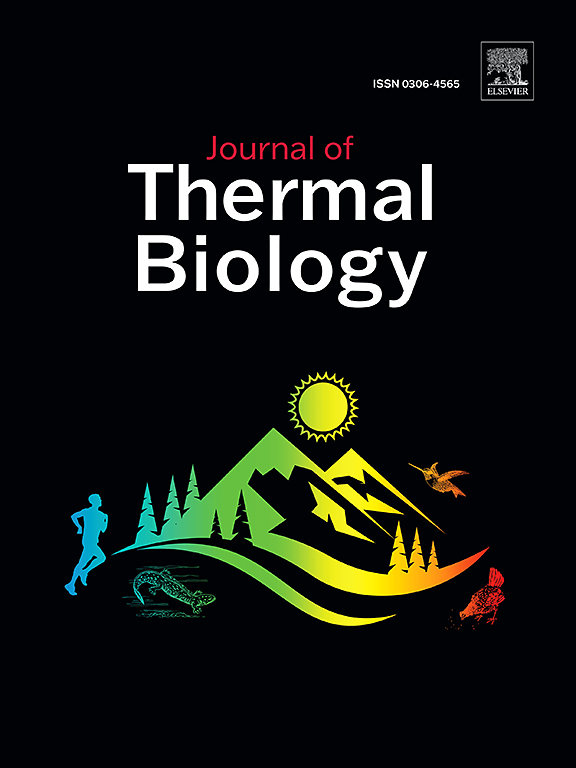姜黄素(Curcuma longa)可调节热应激肉鸡的生产性能、行为、血液代谢产物、抗氧化状态和组织形态学变化
IF 2.9
2区 生物学
Q2 BIOLOGY
引用次数: 0
摘要
本研究旨在评价添加姜黄素对热应激肉鸡生长性能、胴体参数、行为特征、血液代谢产物、抗氧化状态和组织形态学的影响。120只1日龄雏鸡在两个独立的房间饲养35天;一个用来引起热应激,另一个用来维持正常温度。试验采用完全随机设计,随机分为4个处理,每个处理6个重复,每重复5只鸡。热中性对照组饲喂基础饲粮,热应激组饲喂基础饲粮,姜黄素添加组饲喂基础饲粮,姜黄素添加组在基础饲粮中添加1g/kg姜黄素,热应激组在基础饲粮中添加1g/kg姜黄素。添加姜黄素并在热应激条件下饲养的肉仔鸡生长显著(P <;0.05),胴体参数改善组高于其他各组。表现出标准行为的鸟类比例有所提高(P <;强直静止试验时间显著缩短(P <;姜黄素添加组差异无统计学意义(0.05)。总蛋白、白蛋白、球蛋白、HDL、生长激素、T3、T4、TAC、CAT、SOD、IL -10、C3、溶酶体显著升高(P <;0.05)。同时,胆固醇、LDL、甘油三酯和MDA、IL-1β、IFN-γ水平显著降低(P <;添加姜黄素0.05)。姜黄素有效地逆转了热应激引起的肝脏、脾脏、滑囊、肠和乳房肌肉的组织病理变化。由此可见,姜黄素可以缓解热应激对肉鸡健康的负面影响,提高肉鸡的免疫力和抗氧化能力。本文章由计算机程序翻译,如有差异,请以英文原文为准。
Using curcumin (Curcuma longa) as a dietary supplement modulates performance, behavior, blood metabolites, antioxidant status, and histomorphological changes in heat-stressed broiler chickens
This study aimed to evaluate the effect of curcumin supplementation on growth performance, carcass parameters, behavior characteristics, blood metabolites, antioxidant status, and tissue histomorphology in heat-stressed broiler chickens. 120 one-day-old chicks were reared over 35 days in two separate rooms; one designated to induce heat stress and the other to maintain a normal temperature. After a completely randomized design, birds were divided into four treatments, each with 6 replicates of 5 chicks. Treatments were thermoneutral control group fed basal diet, heat-stressed group fed basal diet, curcumin-supplemented group fed basal diet with 1g/kg curcumin, and curcumin-supplemented heat-stressed group fed basal diet with 1g/kg curcumin. Broilers supplemented with curcumin and reared under heat stress conditions grew significantly (P < 0.05) more than other groups with improved carcass parameters. The proportion of birds exhibiting standard behavior was enhanced (P < 0.05), while the duration of Tonic immobility test was significantly decreased (P < 0.05) in curcumin-supplemented groups. Total protein, albumin, globulin, HDL, growth hormone, T3, T4, TAC, CAT, SOD, IL -10, C3, and Lysosomes were significantly increased (P < 0.05). At the same time, cholesterol, LDL, triglycerides and MDA, IL-1β, and IFN-γ levels were significantly reduced (P < 0.05) by adding curcumin. Curcumin effectively reversed the heat stress-induced histopathological changes in the liver, spleen, bursa, intestine, and breast muscles. These results indicate that curcumin can mitigate the negative effects of heat stress on health and stimulate immunity and antioxidant status in broiler chickens.
求助全文
通过发布文献求助,成功后即可免费获取论文全文。
去求助
来源期刊

Journal of thermal biology
生物-动物学
CiteScore
5.30
自引率
7.40%
发文量
196
审稿时长
14.5 weeks
期刊介绍:
The Journal of Thermal Biology publishes articles that advance our knowledge on the ways and mechanisms through which temperature affects man and animals. This includes studies of their responses to these effects and on the ecological consequences. Directly relevant to this theme are:
• The mechanisms of thermal limitation, heat and cold injury, and the resistance of organisms to extremes of temperature
• The mechanisms involved in acclimation, acclimatization and evolutionary adaptation to temperature
• Mechanisms underlying the patterns of hibernation, torpor, dormancy, aestivation and diapause
• Effects of temperature on reproduction and development, growth, ageing and life-span
• Studies on modelling heat transfer between organisms and their environment
• The contributions of temperature to effects of climate change on animal species and man
• Studies of conservation biology and physiology related to temperature
• Behavioural and physiological regulation of body temperature including its pathophysiology and fever
• Medical applications of hypo- and hyperthermia
Article types:
• Original articles
• Review articles
 求助内容:
求助内容: 应助结果提醒方式:
应助结果提醒方式:


